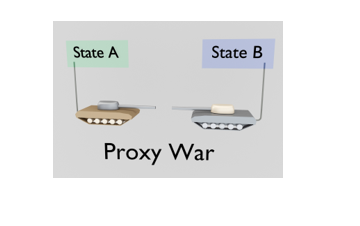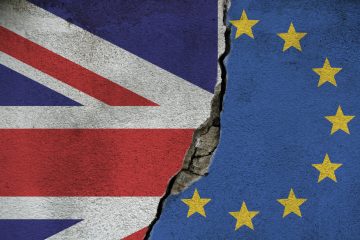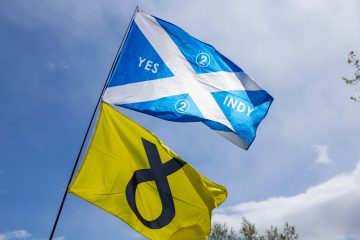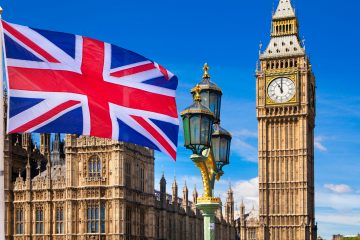
Review of Defekte Visionen. Eine Intervention zur Zukunft der Europäischen Union (Broken Visions. An Intervention on the Future of the European Union) by Alexander Thiele
What does the future of the European Union (EU) look like? Walking along the Rue de la Loi in the European Quarter in Brussels, the white and blue mural stating “The Future is Europe” by graffiti artist NovaDead sends a clear message. The bird in the right-hand corner stands for freedom and peace (referring to the values in Art. 2 of the Treaty on EU), the blue and yellow colours refer to the European flag, and the leaves recall the “green jungle” (a small forest of philodendrons) at the European Parliament in Strasbourg, which could also reflect the complex governance structure of the EU. But beyond this artistic and symbolic vision, what might the future of the EU look like …

Review of the Routledge Handbook of Proxy Wars (with two DPIR contributions)
DPhil candidate Giuseppe Spatafora summarises the key findings of the recently published Routledge Handbook of Proxy Wars, which aims to present the various facets of the phenomenon. The Handbook contains two contributions by DPIR scholars: one by Spatafora himself on the extent to which the Spanish Civil War presents proxy war characteristics, and one by Dr. Vanessa Meier on quantitative approaches to the study of proxy wars. The phenomenon of proxy wars has existed for centuries, well before what is commonly perceived as its heyday—the Cold War. Albeit more modern, the study of proxy wars is not in its infancy either. The Routledge Handbook of Proxy Wars (2023), edited by Assaf Moghadam, Vladimir Rauta, and Michel Wyss, aims to illustrate …

Review of Sehenden Auges: Mut zum Strategischen Kurswechsel (With Eyes Wide Open: The Courage for a Strategic Course Change) by Dr. Stefanie Babst
Just over a year after Russia’s invasion of Ukraine in February 2022, Dr. Stefanie Babst, who has held several senior positions at NATO, including heading its Strategic Foresight Team from 2012 to 2020, has published her latest book, Sehenden Auges: Mut zum Strategischen Kurswechsel (With Eyes Wide Open: The Courage for a Strategic Course Change). The book is an important call for critical reflection and course correction among NATO partners and a plea for the West to continue to support Ukraine, not least in its own interests. The first part of the book contextualises Russia’s war on Ukraine. The author explains Putin’s rise to power, the workings of his power apparatus, and Moscow’s strategic objectives. Babst provides the reader with …

Review of Alt-Finance: How the City of London Bought Democracy by Marlène Benquet and Théo Bourgeron (Pluto Press, 2022)
For years academic literature and broader public debates have largely framed the Brexit referendum as a ‘popular revolt against the elites’. While some emphasised the role of economic factors and others boiled it down to anti-immigration attitudes, most accounts seem to converge around this bottom-up perspective that ordinary people disillusioned with the elites have driven the UK out of the EU. Conversely, apart from a few dissenting voices, the idea that economic elites have been mostly opposed to Brexit has been the prevailing view in the literature. Challenging the over-emphasis on the voting process, Marlène Benquet (University of Paris Dauphine) and Théo Bourgeron (University of Edinburgh) invite us to look more closely at the role played by the economic interests …

“Laters, baby!”: How the British Prime Ministers’ discourse of delay turned Indyref2 into a peripheral issue
Scotland held a vote on independence on 18 September 2014, with 55 percent of the voters rejecting leaving the United Kingdom. Yet, the issue was thrust back into the spotlight in 2016, when the UK voted to withdraw from the EU, with repeated calls for a second Scottish plebiscite growing louder ever since. As in 2014, the generally accepted (albeit not universal) position has been that Westminster’s approval is needed to put a referendum on Scottish independence beyond legal doubt. The two British Prime Ministers (PMs) who held office during this time (2016–2021), Theresa May and Boris Johnson, consistently reiterated their opposition to another referendum and ruled out granting any such consent. In doing so, they employed various discourse strategies …

A Historical Perspective on the Political Limits of “My Body, My Choice”
In the context of the U.S. Supreme Court repeal of Roe v. Wade, the struggle for access to abortion and reproductive freedom continues. In Germany, abortion remains a criminal act only granted under specific conditions and requirements. Apart from ethical and legal requirements, abortions are hardly mentioned in most medical curricula. There is a shortage of medical practices that perform abortions, especially in rural areas and if there is no “medical or criminological indication”, the procedure is not covered by health insurance, costing between €300 to €600. §218 of the criminal code that criminalises and regulates abortion is a remnant from the imperial penal code of 1871 (only the GDR legalised abortion in 1972). Radical feminists in Germany were at …

Should Animals Have Political Rights?
The common view in both scholarship and practice is that politics is an exclusively human concern: a practice by humans for humans. Man, as Aristotle described him, is ‘zoon politikon’, a political animal. For Aristotle, governing and being governed is both the essence and purpose of human beings, and this quality not shared by any other creature that we know of. Crucially, this human-exclusive understanding of politics is still widely shared today. That is not to say, of course, that politics is completely unconcerned about animals. Policy-makers do sometimes turn their attention towards animals, and most states have instituted, for example, a set of animal welfare laws that prohibit practices which are deemed to be ‘cruel’ or to cause ‘unnecessary …

Takeaways from the Vote of No Confidence: What it means for Boris Johnson, the Conservative Party, and Britain
On June 6, Prime Minister Boris Johnson survived a vote of no confidence from the Parliamentary Conservative Party. The vote was triggered by 15 percent of Tory Members of Parliament (MPs) writing to the chair of the 1922 Committee, which represents backbenchers. Thus far, six of the last nine leaders of the Tory Party have faced a leadership challenge of some sort while in office. Yet, while Johnson has joined the list of leaders who survived such a vote, the results of the ballot show that his leadership of the party in the long term remains precarious. How bad were the results? While the relatively low threshold for a vote means Johnson is far from the first leader to face …









